- Home
- Barbara Kingsolver
The Poisonwood Bible Page 9
The Poisonwood Bible Read online
Page 9
One particular day haunts me. I was trying to keep track of my girls but could see only Leah. I recall she was in the pale blue dress with the sash that tied behind her back. Ah1 the girls but Rachel generally ran ragged, so this must have been�for our family�a Sunday, a coincidence of our big day and the villagers'. Leah had a basket in her arms, carrying for me some burden that held her back from her preferred place at the head of the pack. The others had moved out of sight. I knew Nathan would be impatient for our return, so I beckoned to Leah. She had to cross over a row of produce to get to me. Without a thought, as the twin whose legs never failed her, she shifted the basket to her left hip and took a giant step over a pyramid of oranges. I stretched out my hand to her. Right there as she reached for it,
THE REVELATION 89
though, she got stuck somehow, mid-straddle over the oranges, unable to bring the other foot over. Phhjff'The woman squatting beside the oranges leaped up hissing, slicing her hands like scissors blades at the two of us, scorching me with eyes so hot the angry chocolate irises seemed to be melting into the white. A row of men on a bench looked up from their bowls of new beer and stared at us with the same clouded eyes, all motioning for me to move my child: stupid ghost! non-person! straddling a woman's market-day wealth. I can't stop being embarrassed by the memory of myself and Leah there with her genitals�bare, for all anyone knew�suspended over a woman's oranges. A foreign mother and child assuming themselves in charge, suddenly slapped down to nothing by what they all saw us to be.
Until that moment I'd thought I could have it both ways: to be one of them, and also my husband's wife. What conceit! I was his instrument, his animal. Nothing more. How we wives and mothers do perish at the hands of our own righteousness. I was just one more of those women who clamp their mouths shut and wave the flag as their nation rolls off to conquer another in war. Guilty or innocent, they have everything to lose. They are what there is to lose. A wife is the earth itself, changing hands, bearing scars.
We would all have to escape Africa by a different route. Some of us are in the ground now and some are above it, but we're all women, made of the same scarred earth. I study my grown daughters now, for signs they are resting in some kind of peace. How did they manage? When I remain hounded by judgment? The eyes in the trees open onto my dreams. In daylight they watch my crooked hands while I scratch the soil in my little damp garden. What do you want from me? When I raise up my crazy old eyes and talk to myself, what do you want me to tell you?
Oh, little beast, little favorite. Can't you see I died as well? Sometimes I pray to remember, other times I pray to forget. It makes no difference. How can I ever walk free in the world, after the clap of those hands in the marketplace that were plainly trying to send me away? I had warnings. How can I bear the scent of what catches up to me?
THE POISONWOOD BIBLE 90
There was so little time to ponder right and wrong, when I hardly even knew where I was. In those early months, why, half the time I would wake up startled and think I was right back in Pearl, Mississippi. Before marriage, before religion, before everything. Mornings in the Congo were so steamy you couldn't see a thing but cloud come to earth, so you might as well be anywhere. Mama Tataba would appear to me standing in the bedroom doorway in her olive-green cardigan half buttoned up, with the five-dollar holes in the elbows, a knit cap of pilled wool pulled down to her eyebrows, her hands thick as hide; she could have been a woman standing in the alley door of Lutton's General Store in the year of our Lord and my childhood, 1939.
Then she'd say, "Mama Prize, a mongoose be got in the white flour," and I would have to hold on to the bed frame while the landscape swirled like water down a drain and pulled me back to the center. Here. Now. How in the world did a person get to be where I was?
Everything turned on the day we lost them both, Mania Tataba and the accursed parrot, both released by Nathan. What a day that was. For the native members of our household, Independence Day. The bird hung around, casting his vexed eye down on us from the trees, still needing to be fed. The other, she on whom our lives depended, vanished from the village. And the rain poured down and I "wondered, Are we lost right now without knowing it? It had already happened so many times in my life (my wedding day comes to rnind) that I thought I was out of the woods, not realizing I'd merely paused on the edge of another narrow precipice in the midst of a long, long fall.
I can still recite the litany of efforts it took to push a husband and children alive and fed through each day in the Congo. The longest journey always began with sitting up in bed at the rooster's crow, parting the mosquito curtain, and slipping on shoes�for there were hookworms lying in "wait on the floor, itching to burrow into our bare feet. Shoes, then, sliding me across the floor to greet the day.
THE REVELATION 91
Dreaming of coffee. I'm afraid I didn't miss the physical presence of my husband in his absences as much as I missed coffee. Out the back door, into the shock of damp heat, straining for a look at the river: resisting the urge to run.
Oh, that river of wishes, the slippery crocodile dream of it, how it might have carried my body down through all the glittering sandbars to the sea. The hardest work of every day was deciding, once again, to stay with my family. They never even knew. When I pried open the lock meant to keep the beasts and curious children out of our kitchen hut, I nearly had to lock it again behind me, to keep myself in. The gloom, the humidity, the permanent sour breath of rainy season all bore down on me like a bothersome lover. The fresh stench of night soil in the bushes. And our own latrine, which was only one step removed.
Standing at the work table I would leave my own thoughts and watch myseF murdering oranges with our single dull knife, slitting their bellies and squeezing out the red blood. But no, first the fruit had to be washed; these strange, so-called blood oranges were gathered wild from the forest. When I bought them from Mama Mokala I knew they'd passed through the hands of her boys, all of whom bore white crusts on their eyes and penises. Washed, then, with a drop of precious Clorox bleach, measured out like the Blood of the Lamb. It's comical, I know, but I carried through those days the image of a popular advertising campaign from home that pictured teams of very soiled children under the bold invocation: CLOROX NEEDED HERE!
Very well then, the juice wrenched from the disinfected skin, and then the pulpy liquid had to be diluted with water if I hoped to make the precious oranges last at all. It's hard to say �which cost me more dearly: bleach, oranges, or water. Bleach and oranges both I had to bargain for, or beg for in the case of supplies flown in to us by the awful man Eeben Axelroot. Every few weeks he turned up without warning, a sudden apparition in rotten boots and sweat-stained fedora, smoking Tiparillos in my doorway and demanding money for things that were already ours, donated by the Mission League. He even sold us our mail! But then nothing came to us
THE POISONWOOD BIBLE 92
free. Not even water. It had to be carried a mile and a half, and boiled. "Boiled," a small word, meant twenty minutes over a roaring fire on a stove that resembled the rusted carcass of an Oldsmobile. "Fire" meant gathering up a pile of sticks in a village that had already been gathering firewood for all the years since God was a child, picking its grounds clean of combustibles as efficiently as an animal combing itself for lice. So "fire" meant longer and longer forays into the forest, stealing fallen branches from under the blunt-eyed gaze of snakes, just for one single bucket of drinkable water. Every small effort at hygiene was magnified by hours of labor spent procuring the simplest elements: water, heat, anything that might pass for disinfectant.
And food, that was another song and dance. Finding it, learning its name, cutting or pounding or dashing its brains to make it into something my family would tolerate. For a long time I could not work out how all the other families were getting by. There seemed to be no food to speak of, even on a market day -when everybody came around to make the tallest possible pile out of what they had. It didn't seem to stack up to enough sustenance for the
two dozen families in our village.Yes, I could see there was charcoal for cooking it, and shriveled red pili-pili peppers for spicing it, and calabash bowls to put it in, but where was the it, whatever it was? What on God's earth did they eat?
At length I learned the answer: a gluey paste called/w/w. It comes from a stupendous tuber, which the women cultivate and dig from the ground, soak in the river, dry in the sun, pound to white powder in hollowed-out logs, and boil. It's called manioc, I was informed by Janna Underdown. It has the nutritional value of a brown paper bag, with the added bonus of trace amounts of cyanide. Yet it fills the stomach. It cooks up into the sort of tasteless mass one might induce an American child to try once, after a long round of pulled-up noses and double-dog dares. But for the people of Kilanga fufu was the one thing in life, other than time, that appeared to be taken for granted. There will always be manioc. It is the center of life. When the tall, narrow women dressed in their
THE REVELATION
93
sarongs returned serenely from the fields, they toted it in huge parcels impossibly balanced on their heads: manioc-root bundles the size of crumpled horses. After soaking and peeling it, they arranged the long white roots into upright sprays in enamel tubs and passed single file through the village like immense lilies on slender, moving stalks. These women spent their days in the steady labors of planting, digging, and pounding manioc, though the dreamy way they moved through that work made it seem entirely separate from any end product. They reminded me of the groups of black men called gandy dancers in the Old South, who would come along the railroad track chanting, nodding, stepping forward and back in unison, banging out a rhythm with their steel rods, captivating children and moving on before you realized they had also, incidentally, repaired the track. That is how these women produced manioc, and that is how their children ate it: with no apparent thought to the higher purposes of production and consumption. Fufu was simply another word for food. Any other thing a person might eat�a banana, an egg, the bean called mangwansi, a piece of fire-blackened antelope flesh�was just the opposite, and its consumption was seen as a remarkable, possibly uncalled-for occasion.
My family required remarkable occasions three times a day. They couldn't understand that the sort of meal they took for granted, a thirty-minute production in the land of General Electric, translated here to a lifetime of travail. A family might as well sit waiting for Mother and her attendants to come out of the kitchen with three Thanksgiving dinners a day. And Mama Tataba managed to do it, complaining all the while. She muttered while she worked, never resting, only pausing from time to time to hike up the waist of her wraparound pagnc underneath her wool sweater. She rolled her eyes whenever she had to undo my mistakes: the tin cans I forgot to wash out and save, the bananas I failed to check for tarantulas, the firebox I once stoked entirely with sticks of bdngala�the poison-wood tree! She slapped the match out of my hand as I bent to light it, then pulled out the green sticks one by one with a potholder, explaining tersely that the smoke alone would have killed us all.
THE POISONWOOD BIBLE 94
In the beginning I knew no Kikongo beyond the practical words she taught me, so I was spared knowing how she cursed our mortal souls as evenhandedly as she nourished our bodies. She pampered my ungrateful children, and resented us utterly. She could reach her fingers deep into a moldy bag, draw out a miraculous ounce of white flour, and slap out biscuits. She rendered goat fat into something like butter, and pulverized antelope meat into hamburgers with a device I think had been rigged from the propeller of a motorboat. She used a flat rock and the force of her will to smash groundnuts into passable peanut butter. And at the terminus of this long labor sat Rachel at the foot of the table: sighing, tossing her white hair from her shoulders, announcing that all she wished for in this world was "Jiffy, smooth. Not crunchy."
Fufu nsala, MamaTataba called us. I gathered this had to do with fufu, the food staple, not yet knowing Kikongo is a language that is not exactly spoken but sung. The same word slanted up or down the scale can have many different meanings. When Mama Tataba incanted this hymn to all of us, under her breath, she was not calling us fufu eaters or fufu shunners or anything I could have guessed. Fufu nsala is a forest-dwelling, red-headed rat that runs from sunlight.
I'd thought I was being brave. The very first time I went into the kitchen house, a snake slithered away from the doorstep and a tarantula eyed me from the wall, hunkering down on his bandy legs like a football player on the offensive line. So I carried a big stick. I told Mama Tataba I'd grown up knowing how to cook, but not to be a circus trainer. Heaven only knows how she must have despised her pale rat of a cowering mistress. She couldn't have imagined the likes of an electric range, or a land where women concerned themselves with something called waxy yellow buildup. As much as she held me in contempt, she may never have had any real inkling of my true helplessness. I like to think she wouldn't have left us had she known. As it was, she left a pitched wake in which I felt I would drown.
Strange to say, it was Nathan's frightful confidence in himself that drove her off. He believed, as I did, we were supposed to have come
THE REVELATION
95
prepared. But there is no preparing for vipers on the doorstep and drums in the forest, calling up an end to a century of affliction. By the time summer trailed off into the season of endless rains, it was clear there was going to be trouble. I couldn't stop imagining the deaths of my children. I dreamed them drowned, lost, eaten alive. Dreamed it, and woke in a stone-cold fright. When sleep refused to return, I lit the kerosene lamp and sat alone until dawn at our big dining-room table, staring at the words of the Psalms to numb my mind: Lord, I have loved the habitation of thy house, and the place where thine honour dwelleth. Gather not my soul with sinners, nor my life with bloody men.
Redeem me.,
At sunrise I sometimes left the house to walk. To avoid the river, I took the forest path. More than once I startled elephant families browsing in the clearings. Woodland elephants are different from their grand cousins who stomp across the grasslands: they're smaller and more delicate, nuzzling through the leafy soil with rosy-pink tusks. Sometimes in the dawn light I also saw families of Pygmies moving among the shadows, wearing nothing but necklaces of feathers and animal teeth, and on rainy days, hats made of leaves. They were so small�truly less than half my size�and so gaily decorated, I thought for a long time they were children. I marveled that whole bands of boys and girls were out in the forest all on their own, with knives and spears and infants strapped on their backs.
Perhaps it was reading the Bible that had set my mind in such an open frame, ready to believe in any bizarre possibility. That, and the lack of sleep. I needed to tie myself down by some kind of moorings, but there was no one at all to talk to. I tried poring over the American news magazines sent to us via the Underdowns, but I only found them disturbing. President Eisenhower spoke of having everything under control; the Kennedy boy said Uncle Ike was all washed up and we need look no farther than the Congo�� Congo!�for evidence of poor U.S. leadership, the missile gap, and proof of the Communist threat. The likes of Eleanor Roosevelt declared we ought to come forth with aid and bring those poor
THE POISONWOOD BIBLE 96
children into the twentieth century. And yet Mr. George F. Kennan, the retired diplomat, allowed that he felt "not the faintest moral responsibility for Africa." It's not our headache, he said. Let them go Communist if they feel like it.
It was beyond me to weigh such matters, when my doorstep harbored snakes that could knock a child dead by spitting in her eyes.
But Nathan wouldn't hear my worries. For him, our life was as simple as paying in cash and sticking the receipt in your breast pocket: we had the Lord's protection, he said, because we came to Africa in His service.Yet we sang in church "Tata Nzolo"! Which means Father in Heaven or Father of Fish Bait depending on just how you sing it, and that pretty well summed up my quandary. I could never work ou
t whether we were to view religion as a life-insurance policy or a life sentence. I can understand a wrathful God who'd just as soon dangle us all from a hook. And I can understand a tender, unprejudiced Jesus. But I could never quite feature the two of them living in the same house.You wind up walking on eggshells, never knowing which Tata Nzolo is home at the moment. Under that uncertain roof, where was the place for my girls? No wonder they hardly seemed to love me half the time�I couldn't step in front of my husband to shelter them from his scorching light. They were expected to look straight at him and go blind. '" Nathan, meanwhile, wrapped himself up in the salvation of Kilanga. Nathan as a boy played football on his high school team in Killdeer, Mississippi, with great success evidently, and expected his winning season to continue ever after. He could not abide losing or backing down. I think he was well inclined toward stubbornness, and contemptuous of failure, long before his conscription into the war and the strange circumstances that discharged him from it. After that, hounded by what happened in a Philippine jungle and the ghosts of a thousand men who didn't escape it, his steadfast disdain for cowardice turned to obsession. It's hard to imagine a mortal man more unwilling to change his course than Nathan Price. He couldn't begin to comprehend, now, how far off the track he was with his baptismal fixation. The village chief, Tata Ndu, was loudly

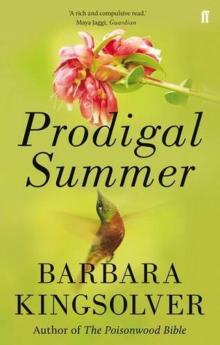 Prodigal Summer: A Novel
Prodigal Summer: A Novel Animal Dreams: A Novel
Animal Dreams: A Novel The Poisonwood Bible
The Poisonwood Bible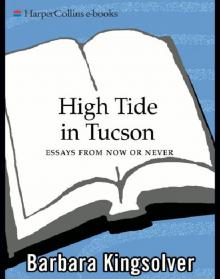 High Tide in Tucson
High Tide in Tucson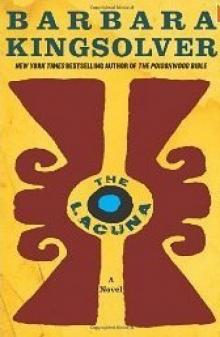 The Lacuna
The Lacuna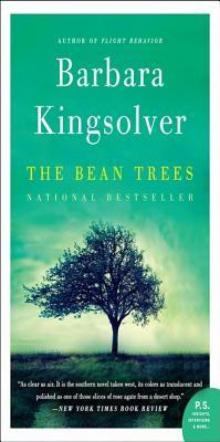 The Bean Trees
The Bean Trees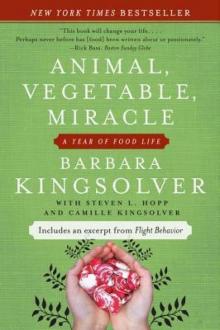 Animal, Vegetable, Miracle: A Year of Food Life
Animal, Vegetable, Miracle: A Year of Food Life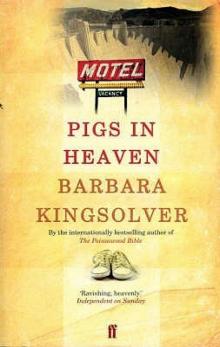 Pigs in Heaven
Pigs in Heaven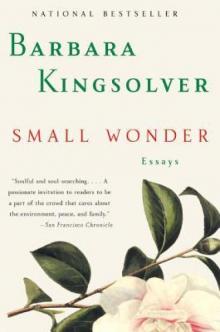 Small Wonder
Small Wonder Flight Behavior
Flight Behavior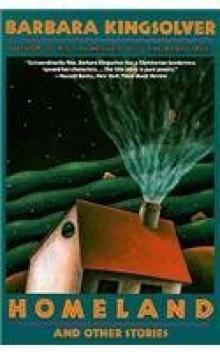 Homeland and Other Stories
Homeland and Other Stories How to Fly (In Ten Thousand Easy Lessons)
How to Fly (In Ten Thousand Easy Lessons) Unsheltered
Unsheltered Animal Dreams
Animal Dreams Prodigal Summer
Prodigal Summer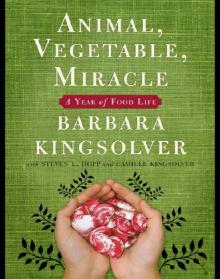 Animal, Vegetable, Miracle
Animal, Vegetable, Miracle